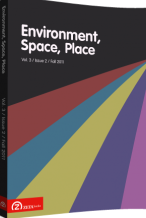From Non-Place to Rhizome: A Geophilosophical Analysis of Contemporary Globalized Space
From Non-Place to Rhizome: A Geophilosophical Analysis of Contemporary Globalized Space
Author(s): Laura MENATTISubject(s): Philosophy
Published by: Zeta Books
Keywords: Rosario Assunto; homo oeconomicus; Gilles Deleuze; geophilosophy;
Summary/Abstract: Rosario Assunto, an Italian philosopher of aesthetics begins one of his most interesting and dense essays with a terrifying image about the Earth where we live—“calvizie della terra dissacrata” (1983, 15)—meaning that the Earth becomes bald because of the actions of the man and loses every characteristics of beauty and sacredness. According to Assunto’s theory the homo oeconomicus is the author and the promoter of a Promethean, titanic, industrial and malodorous town where the sense of art, beauty and the harmony in landscape are forgotten and erased. The Modern homo oeconomicus is satisfied in his thoughts and works with such a desecrated and raped Earth, rather, he desires this kind of landscape as a symbol of his own progress. I remember that when I first red this essays I asked to myself what kind of philosophy I could propose in such a horizon and what kind of analysis I could develop. Maybe geophilosophy could now give some answers. Geophilosophy, according to the version I will propose, deconstructs the usual and reductionist grammar about the concept of space and place, suggesting a new expressive, perceptive and, finally, ethic possibility for the relation between human beings and places. In this paper I provide my interpretation of geophilosophy, inspired by Gilles Deleuze’s words, the first philosopher of XX century who wrote about this concept. Then I will analyze non-places according to the famous definition proposed by the Marc Augé and I will go beyond the French anthropologist’s definition suggesting a new interpretative model for places and non-places by linking my idea of geophilosophy to Deleuze’s concept of rhizome. The aim of this article is to demonstrate the complexity of the concept of place and finally put into evidence that places, which constitute our roots, are all the spaces we have around, even non-places. Post-modern era mainly produces non-places: geophilosophy has to explain the philosophical and cultural reasons for this production by pointing out which possible modalities of connection we can find between contemporary human beings and places.
Journal: Environment, Space, Place
- Issue Year: 2011
- Issue No: Vol.3/2
- Page Range: 22-50
- Page Count: 29
- Language: English
- Content File-PDF

